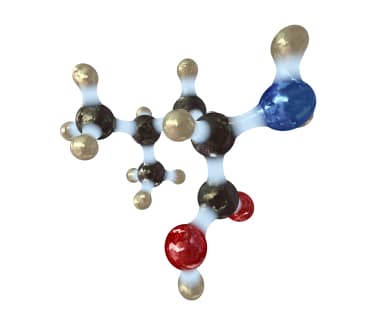 To burn fat and build lean body mass, you have to work your muscles in a way that causes them to adapt and grow. How you work out is important, but don’t underestimate the power of nutrition. Without the proper ratio of carbohydrates, fat, and protein, you won’t maximize your results. Some athletes, runner, and bodybuilders turn to supplements to get additional components their diet is lacking. While not all supplements live up to their claim, there’s growing interest in using branched-chained amino acids to boost athletic performance and stimulate muscle growth. What are branched-chain amino acids, and can they help you get fit faster?
To burn fat and build lean body mass, you have to work your muscles in a way that causes them to adapt and grow. How you work out is important, but don’t underestimate the power of nutrition. Without the proper ratio of carbohydrates, fat, and protein, you won’t maximize your results. Some athletes, runner, and bodybuilders turn to supplements to get additional components their diet is lacking. While not all supplements live up to their claim, there’s growing interest in using branched-chained amino acids to boost athletic performance and stimulate muscle growth. What are branched-chain amino acids, and can they help you get fit faster?
What Are Branched-Chain Amino Acids?
Amino acids are the building blocks of protein and muscle. Humans can make about ten of these amino acids, so they’re considered to be non-essential. There is another group of amino acids humans can’t synthesize, and they must come from diet. These are called essential amino acids. The branched-chain amino acids, leucine, isoleucine, and valine are examples of these. They are essential amino acids with a branched-chain structure the body requires but can’t synthesize.
Does Supplementing with Branched-Chain Amino Acids Boost Athletic Performance?
Some experts believe that branched-chain amino acids boost athletic performance in several ways. The first is by reducing workout fatigue. When you exercise hard for long periods of time you deplete your glycogen stores. This leads to muscle fatigue. But this isn’t the only cause of exercise fatigue. The brain may play a role as well.
Exercise causes levels of the neurotransmitter serotonin to increase in the brain. This rise in serotonin is thought to contribute to “central” or brain-related fatigue. This is where the brain sends a message to the muscles that they’ve worked hard enough, and it’s time to take a rest. You experience this as an overwhelming desire to stop and rest. It’s thought the rise in serotonin levels that leads to central fatigue can be prevented by supplementing with branched-chain amino acids. When you consume more branched-chain amino acids less tryptophan gets into the brain. This means less serotonin is formed to cause fatigue.
One study published in the Journal of Sports Medicine and Physical Fitness showed that supplementing with branched-chain amino acids increased the time to fatigue during exercise, but not all evidence supports this. One study published in the Journal of Physiology showed that branched-chain amino acids did not affect how long participants could exercise before becoming fatigued. Furthermore, if decreasing the amount of tryptophan that enters the brain prevents central fatigue, then supplementing with tryptophan should cause faster fatigue. Research shows that this doesn’t happen.
Some experts believe that supplementing with branched-chain amino acids boosts muscle growth and prevents the breakdown of muscle tissue during long exercise sessions. There is some evidence they increase levels of insulin and growth hormone and reduce cortisol, all of which are favorable for muscle protein synthesis. Still, there’s no evidence that taking a branched-chain amino acid supplement boosts muscle growth.
Should You Supplement with Branched-Chain Amino Acids?
It’s important to get adequate quantities of protein in your diet, especially essential amino acids the body can’t make. Most people can do this through diet without supplementing with branched-chain amino acids. There are sports drinks that contain branched-chain amino acids, but the amounts are so small that they’re unlikely to be of benefit. The amount of branched-chain amino acids you’d need to reduce exercise fatigue and boost muscle growth if these theories are true is high. Furthermore, no one knows the long-term effects of supplementing with high levels of amino acids, particularly the effect it has on the kidneys.
Your best bet? Get your protein by eating skinless chicken breasts, fish, eggs, plant-based protein, and low-fat dairy instead. There’s not enough evidence to recommend branched-chain amino acid supplements at this point.
References:
J. Physiol. 486:3:789-94.
J. Sports Med. Phs. Fitness. 2011 Mar; 51(1)L 82-8.
Related Articles By Cathe:
New Study Looks at Branched-chain Amino Acids for Muscle Hypertrophy
Buyer’s Guide to Amino Acid Supplements
Branched-Chain Amino Acid Supplements: Why You Don’t Need Them
Will Eating Protein at Bedtime Help You Build Muscle?
Can You Consume Too Much Protein?
Why Leucine is Key for Muscle Growth
Branched-Chain Amino Acids: Can They Help You Get Fit Faster?

